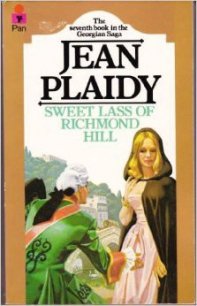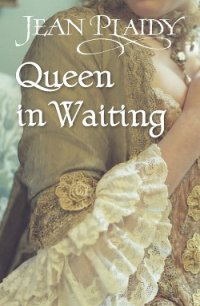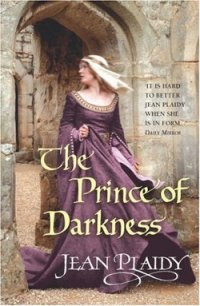The Prince and the Quakeress - Plaidy Jean (книги полностью бесплатно TXT) 📗
The King’s sister, Princess Augusta, had come to speak to her accompanied by Lady Bute and Lady Susan Stewart.
How maddening! They surrounded her and shut out the sight of the King.
How was she? How sad that she could not dance! And had she enjoyed her stay in the country...apart from the time when she had been incapacitated? That must have been most annoying, and painful too. Oh, she was brave to come to the ball. Should she not have stayed in the country until she was quite...quite better. But perhaps she felt she must come. Life in the country was perhaps a little dull.
Oh, be silent, thought Lady Sarah, while she smiled at them and answered their silly questions. Do you think I don’t know what you are doing? You are trying to keep the King away from me and you won’t succeed.
Nor did they, for here was George unable to endure the separation any longer.
‘Augusta,’ he said to his sister, I should like to see you dance the Betty Blue.’
Augusta looked startled, but the King did not seem to notice; he was smiling at Sarah.
‘It is a dance that you are acquainted with. I am very fond of it because it was taught to me by a lady.’
‘Was it, Your Majesty?’ She was smiling up at him bewitchingly, more for the benefit of the watching ladies—whom she was sure were grinding their teeth with rage—than for him.
‘Do you not know what lady?’ he asked.
‘No, Sire.’
‘Well, I will tell you. It was taught me by a very pretty lady who came from Ireland, a year last November.’
Sarah put her head on one side pretending to consider, which delighted the King.
‘I am talking to her now,’ prompted George. ‘She taught it to me at the ball on Twelfth Night.’
Sarah laughed, watching the sick looks on the faces of the three women. ‘In truth, Your Majesty, I did not remember until you reminded me.’
‘Perhaps you did not. But I have a very good memory for what relates to that lady. I had a pretty new country dance of my own, which should have been danced at the late King’s birthday...if he had lived. What do you think I named it?"
‘I have no idea, Sire.’
‘The 25th of February. That is a very important date to me. Do you know why?’
She pretended to be confused and stammered: ‘I...I cannot think, Sire. I know it is my birthday.’
He laughed triumphantly. ‘That is why.’
The Princess Augusta groaned inwardly at this conversation which the King seemed to find sparkling with wit, and which showed, thought the Princess, how deeply in love he was if he could mistake such puerile utterings for conversation even.
She would report what had been said to her mother—and it seemed that others would be reporting it all over the place because there was no doubt that many had their ears cocked.
So the King stayed at the side of Lady Sarah during most of the evening, now and then being forced, reluctantly it was obvious, to do his duty and dance. But he lost no time in returning to her chair. In fact, so absorbed was he that he remained talking to her until one o’clock, quite forgetting that the dancers were waiting for him to end the ball.
No one was in any doubt after that birthday ball of the King’s feelings for Sarah Lennox.
There was jubilation at Holland House.
‘The King,’ said Lady Caroline, ‘is surely on the brink of a declaration.’
• • •
The Princess Augusta was sighing with relief. She sent at once for Lord Bute. Colonel Graeme had reported that a marriage of the King of England and his sister Charlotte Sophia would be very acceptable to the Duke of Mecklenburg-Strelitz and also to Charlotte Sophia’s mother the Dowager Grand Duchess. The Colonel described the Princess’s appearance as pleasant (which implied that she was no beauty) and added that in his opinion she appeared to be a bride in every way suitable for His Majesty.
‘There must now be no delay,’ said the Princess. ‘We must talk to George.’
Bute agreed and Augusta asked her son if he would call on her as she had something of great importance to say to him.
George arrived, having no notion of what was to be discussed, but Augusta did not leave him long in doubt.
‘My son,’ she said, ‘it is time you were man led.’
George smiled happily. ‘I myself have been thinking that.’
‘There has as yet been no coronation,’ went on the Princess.
‘No. I wished my Queen to share in it.’
‘That will be excellent and we have found a very suitable bride for you.’
George was silent, and the Princess glanced at Bute who said quietly: ‘Colonel Graeme reports from Mecklenburg-Strelitz that the Princess Charlotte Sophia will be an ideal bride for you and she and her family are eager for the marriage.’
‘This...is impossible.’
‘It is highly suitable,’ said his mother sharply.
‘You do not understand,’ said the King. ‘I have already decided.’
‘Then I trust you will think again, for this is of the utmost importance.’
‘I have pondered a great deal on this matter. I love the Lady Sarah Lennox and she loves me.’
‘Are you sure of that, Sire?’ asked Bute gently.
‘Sure of it! I am never more sure of anything.’
The Princess was about to speak but Bute looked at her and she nodded, implying that he must direct the way this painful interview should go.
‘Sire,’ said Bute in his kindest and most tender voice, ‘a little while ago that young lady was making it very clear that she preferred another gentleman to you.’
‘That was not so. She was merely...amusing herself.’
‘Amusing herself? When the King had shown preference for her?’
‘I did not wish her to regard me as a King but as a man.’‘
‘She clearly did neither,’ retorted the Princess tartly. ‘She treated you like a foolish boy and I must say that you behaved like one—to allow her to flout you, use you to attract this young...young rake...and then beckon you when she finds he has done with her!’
‘This...this is not so.’
‘The King is clearly deeply affected by Lady Sarah,’ said Bute gently.
George turned to him. Best of friends! Always reliable! He would understand and help him to explain.
‘And in that case,’ said George, ‘since we love each other would it not be desirable for us to marry?’
‘I fear,’ Bute reminded him, still in the same kind voice, ‘it would not be desirable from the nation’s point of view. You see, Sire, you are a King. You are young and have not until now been brought face to face with your obligations. Your marriage is not your own affair. It is the nation’s. Every King or Queen has to face this problem. It rarely happens that what they desire is what the nation needs. It is the sad side of a ruler’s life. Self-sacrifice. Again and again he must pass by what he desires to give his country what it needs.’
George was beginning to lose his confidence. ‘But why should the nation not want Sarah?’
‘A King’s sons and daughters must be royal,’ said the Princess. ‘They should have royal blood on both sides.’
‘Sarah is royal,’ cried George eagerly.
The Princess laughed. ‘Yes, descended from a whore!’
George flushed as though he had been struck. ‘I beg of you, Madam, do not say such a thing.’
‘I am concerned with the truth,’ retorted his mother. ‘We all know where the Richmonds got their title. Through Louise de Keroualle, sent from France by the King of that country to be his spy and the King of England’s mistress. That at least is common knowledge.’
‘You...can scarcely blame Sarah.’
‘I do not blame her. I merely say she is unfit to be Queen of England. George, be reasonable. The people of this country are waiting for an announcement of your marriage. They expect you to marry. They are growing impatient. And they expect you to make the right marriage.’
‘I am sure I am the best judge...’
The Princess said hotly: ‘As you were the best judge in that disastrous matter of the Quaker girl.’




